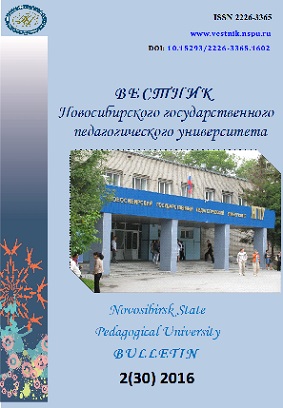Семантические переходы в абстрактных существительных
Semantic shifts in abstract nouns
Author(s): Galina Ivanovna Kustova Subject(s): Philology
Published by: Новосибирский государственный педагогический университет
Keywords: Abstract vocabulary; infinitive; prepositional phrase «po + Dat.»; valency of content; valency of theme; speech and mental semantics
Summary/Abstract: The article's objective is to identify the types and mechanisms of semantic shifts in verbal names, show the factors influencing the change of lexical meanings. It is hypothesized that the types of semantic shifts are substantially related to the thematic class of the initial meaning. In turn the derived meaning of an abstract lexeme belongs to a different semantic class and has a new valency. The paper deals with two types of semantic shifts: (1) as a result of a shift to the area of modality the abstract noun acquires the ability to be followed by the infinitive (‘sense of events’ case) – net smysla bezhat’ (‘it makes no sense to run’); (2) abstract noun acquires a valency “po + Dat.” as a result of shift to the area of “in-formation” or “parameters”. Abstract vocabulary may belong to various semantic classes: nepriyatnost’ (‘nuisance’, ‘trouble’, ‘annoyance‘), promakh (‘mistake’), razlad (‘discord’); referendum, soveshchanie (‘meeting’), turnir (‘tournament’); mery (‘measures’) / rabota (‘work’) / usiliya (‘efforts’) [po uregulirovaniyu (‘on settlement of’)] et al. These lexemes have much in common with words de-noting mental states or propositional attitudes e. g. X thinks that Y, where Y is the content (theme) of the proposition expressed by a subordinate clause or by a prepositional group (X thinks about Y). Abstract lexemes can have similar valency in prepositional phrases of po X [Dat.] type (po here means about, on, of), if: (a) there is a semantic shift to the "Information" area: trebo-vaniye soblyudat’ dogovor (‘the requirement to comply with the contract’) shifts to trebovaniya po soblyudeniyu dogovora (‘requirements on/of compliance with the contract’); (b) there is a shift of the lexeme into the "Information" area: raskol po probleme Iraka (‘split on Iraq issue’); (c) there is a shift of the lexeme into "Parameters" area: potrebnosti po gazu (‘gas demand’).
Journal: Вестник Новосибирского государственного педагогического университета
- Issue Year: 6/2016
- Issue No: 2
- Page Range: 73-85
- Page Count: 13
- Language: Russian

